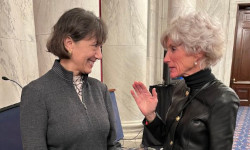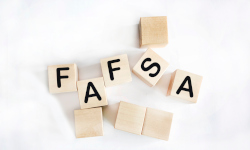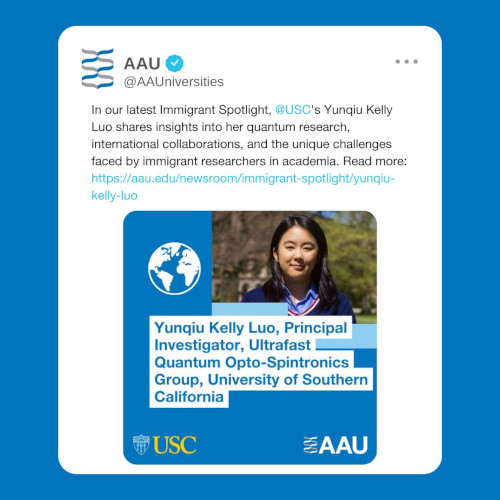 AAU, Associations Urge Biden Administration to Rescind Proposal That Threatens American Innovation and University Public-Private Partnerships
AAU, Associations Urge Biden Administration to Rescind Proposal That Threatens American Innovation and University Public-Private Partnerships
AAU sent multiple comment letters this month urging the Biden administration to rescind a policy proposal that would threaten the American innovation system and discourage partnerships between nonprofit research universities and the private sector that help bring cutting-edge technologies to the public.
Last December the National Institute of Standards and Technology proposed a framework for when federal agencies could exercise “march-in” rights granted to them under the 1980 Bayh-Dole Act. The legislation encourages universities and researchers holding patents developed through federally funded research to partner with the private sector to bring new discoveries to market. It also grants federal agencies a limited right to “march in” and to require patent owners to grant additional patent licenses to others. The proposed framework reinterprets the Bayh-Dole Act to allow federal agencies to seize patents for drugs or individual products that they deem too expensive.
Last week AAU submitted comments on the proposed framework to NIST and also joined the American Council on Education, the Association of American Medical Colleges, the Association of Public and Land-grant Universities, AUTM, and the Council on Governmental Relations in sending another letter offering joint comments.
Both letters recommended that the administration immediately withdraw the framework because it violates the spirit and intent of the Bayh-Dole Act and because it would disincentivize private sector partners from licensing advancements made through federally funded research initiatives at nonprofit universities. The associations’ joint letter emphasized that “agency considerations on petitions for march-in should be based on the original intention of the Bayh-Dole Act, not a reinterpretation to achieve certain market goals.” AAU argued in its letter: “Without rescission, the existence of this framework as potential agency policy will continue to create uncertainty and confusion for our member institutions and their private sector partners and weaken the powerful engine of innovation and research that is public-private collaboration in the United States.”
 AAU Co-Hosts Welcome Reception for New NIH Director
AAU Co-Hosts Welcome Reception for New NIH Director
On January 31, AAU President Barbara R. Snyder joined a welcome reception on Capitol Hill for the recently sworn-in 17th director of the National Institutes of Health, Monica Bertagnolli. AAU co-hosted the reception along with other NIH supporters, including the American Cancer Society, Research!America, the Association of American Medical Colleges, ACT for NIH Foundation, the Association of Public and Land-grant Universities, and others. The NIH is the federal government’s medical research agency and partners with America’s leading research universities to develop critical diagnostics, medicines, and new treatments that keep the nation healthy.
A number of congressional leaders offered remarks at the reception in support of federal funding for the NIH, including Senate Labor-HHS Appropriations Subcommittee Ranking Member Shelley Moore Capito (R-WV), Sen. Chris Van Hollen (D-MD), Senate HELP Committee Ranking Member Bill Cassidy (R-LA), House Appropriations Committee Ranking Member Rosa DeLauro (D-CT), Rep. Steny Hoyer (D-MD), and Rep. Greg Murphy (R-NC).
Bertagnolli spoke at the reception about her priorities, including attracting and retaining talent for the biomedical research workforce; improving data collection and accessibility for clinical applications; expanding access to clinical trials to underserved populations; and strengthening the public’s trust in the NIH and in science.
 Some Colleges Extend Financial Aid, Enrollment Commitment Deadlines in Response to FAFSA Delays
Some Colleges Extend Financial Aid, Enrollment Commitment Deadlines in Response to FAFSA Delays
The New York Times reported last week that many colleges and universities are extending their deadlines for students to accept admissions offers in response to delays associated with the Free Application for Federal Student Aid (FAFSA). Several AAU members, including eight campuses in the University of California system, The Ohio State University, and the University of Minnesota, are among those that have announced that students and their families will have more time to either submit the FAFSA form or to accept an offer of admission.
Last month, the Department of Education announced that colleges and universities will not begin receiving students’ FAFSA data until March. This means that many students and families will have to wait longer than usual to receive financial aid offers from colleges and will have less time than usual to make informed decisions about where to enroll. In response to the news, earlier this month, AAU joined nine other higher education associations in encouraging “colleges and universities to provide flexibility to students and families as they consider their offers of admission and financial aid.”
 Newly Established National Semiconductor Technology Center to Accelerate Semiconductor Innovations and Workforce Development
Newly Established National Semiconductor Technology Center to Accelerate Semiconductor Innovations and Workforce Development
The Biden administration announced on Friday that it is launching the National Semiconductor Technology Center (NSTC) to bring together public and private partners, including higher education institutions, to accelerate innovations in semiconductor technology and build a diverse semiconductor workforce. The administration said that it is planning to invest at least $5 billion in the NSTC under the CHIPS and Science Act of 2022.
According to the White House, the public-private consortium will ensure that the United States “leads the way in the next generation of semiconductor technologies by supporting the design, prototyping, and piloting of the latest semiconductor technologies.” The NSTC will also host a Workforce Center of Excellence that will invest in creating “equitable training pathways to connect Americans to the good-paying, high-quality jobs in critical industries of the future.”
The NSTC will be operated by the National Center for the Advancement of Semiconductor Technology (Natcast). Public and private entities interested in becoming a part of the NSTC can join the NSTC Community of Interest.
Friends of IES Urges Congress to Increase Appropriations for Institute of Education Sciences
Last week, the Friends of Institute of Education Sciences, a coalition of 35 universities and higher education organizations including AAU, sent a letter to the leaders of the House and Senate Appropriations Committees urging them to ensure that the final FY24 appropriations package provides “the highest possible amount” for the Institute of Education Sciences and “does not cut funding for IES programs.”
IES provides scientific evidence to the Department of Education to help shape education policy. Its research and evaluations support student learning as well as student and teacher success nationwide.
 AAU Institutions Recognized for Excellence in Fostering Diversity in Biomedical and Behavioral Research
AAU Institutions Recognized for Excellence in Fostering Diversity in Biomedical and Behavioral Research
Several AAU universities are among the recipients of the National Institutes of Health’s Institutional Excellence in Diversity, Equity, Inclusion, and Accessibility (DEIA) in Biomedical and Behavioral Research Prize.
According to the NIH, the $100,000 prize is awarded to institutions that “have implemented effective strategies that promote equity and eliminate structural barriers to success among students, postdoctoral scholars, and faculty in the biomedical and behavioral research enterprise.” The prize winners include the University at Buffalo (SUNY); the University of California, Davis; and Vanderbilt University. Congratulations to the winners!
News of Interest
The Boston Globe: Brown University Outlines ‘Concrete Steps’ to Address Bias, Harassment, Discrimination Amid Violence in Middle East – Brown University President Christina Paxson announced last week that the institution is taking several actions “to enhance its anti-discrimination and anti-harassment policies amid ongoing tensions resulting from violence in the Middle East.” Among other things, the university launched a new website with resources for the campus community and created a new office to “handle reports of bias, discrimination, and harassment.”
Milwaukee Journal Sentinel: UW-Madison to Embark on a Faculty Hiring Spree. One Area of Research Focus: Artificial Intelligence – The University of Wisconsin-Madison announced a new staffing initiative “to increase faculty hiring by 40% per year” over the next three to five years. The university initially plans to hire up to 50 faculty with expertise in artificial intelligence. UW-Madison Chancellor Jennifer Mnookin said that the initiative is intended to spark “audacious, interdisciplinary inquiry leading to groundbreaking discovery and education.”
Chronicle of Higher Education: Teaching Evaluations Are Broken. Can They Be Fixed? – Colleges and universities across the nation are rethinking how to effectively evaluate teaching. One effort is TEval, which (in collaboration with AAU) is seeking “to advance the use of evidence-based teaching methods by changing the way teaching is evaluated.” Another is an AAU project focused “on changing the evaluation process in STEM disciplines.” The efforts are driven by “a growing body of research” that “shows that effective teaching is hugely influential in determining whether students succeed in college.”
USA Today: Delays. Processing Errors. FAFSA Can Be a Nightmare. The Dept. of Education Is Stepping In. – The Department of Education announced several steps last week to help colleges and universities get ready to receive data from the Free Application for Federal Student Aid (FAFSA). The launch of the revised form has been plagued with delays, leaving students and their families with limited time to compare aid offers and make final enrollment decisions.
NPR: Dartmouth Will Again Require SAT, ACT Scores. Other Colleges Won’t Necessarily Follow – Dartmouth College announced last week that it will “once again require applicants to submit standardized test scores, beginning with the next application cycle, for the class of 2029.” The decision was driven by a study that found that “test scores could have helped less advantaged students … gain access to the school.”
Politico: Education Department Sends Final Title IX Rule to OMB for Approval – Earlier this month, the Department of Education sent its final rule updating Title IX regulations to the Office of Management and Budget for review. The department first proposed the rule, meant to guide universities that receive federal funding on how to implement laws that prohibit sex-based discrimination in educational programs and activities, in July 2022.
Featured Research

UW-Madison ResearchersFirst to 3D-Print Functional HumanBrain Tissue
Scientists at the University of Wisconsin-Madison have “developed the first 3D-printed brain tissue that can grow and function like typical brain tissue.” The printed brain tissue could help scientists study the brain and advance treatments for “neurological and neurodevelopmental disorders.”

Tulane University to Lead Project Assessing Impact of Sea-Level Rise on Military Installations
Tulane University has received a $3.2 million grant from the Department of Defense Strategic Environmental Research and Development Program to “lead a team of climate scientists and engineers who will evaluate dangers from sea-level rise for the more than 1,800 military installations across the globe.”
From Our Feeds

AAU’s “Immigrant Spotlight” series highlights the incredible contributions of immigrant researchers at U.S. universities. Our next article in the series features University of Southern California Gabilan Assistant Professor of Physics and Astronomy Yunqiu Kelly Luo.
Luo grew up in the cities of Chengdu and Yibin in Sichuan Province, China, and earned a doctoral degree in physics at The Ohio State University. Her research on magneto-optical probes and improving control over quantum degrees of freedom is making essential contributions to the fields of quantum science and technology. Read more about Luo’s work and journey on the AAU website.